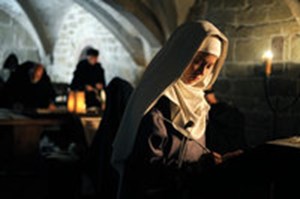
Tsai Ming-liang has thrice directed films that were nominated for the Golden Palm award at the Cannes Film Festival. Face lost out on this year's prize to Michael Haneke's The White Ribbon (more on that film this weekend), but its subject matter (a loose retelling of the Salomé story) and setting (much of it was shot at the Louvre) could attract some viewers not normally game for a 140 minute art film in French and Malaysian.
If I say then that I was completely and utterly lost while watching Face, I mean that as an indictment of my own capacity to deal with non-narrative film and not of the film itself.
The program's summary makes the film out to be a little like a French-Asian Synecdoche, New York and I couldn't help thinking a little of Fellini's 8 1/2, but if you want plot summary with your subject matter description, I'm afraid you've come to the wrong place.
Then again, if you are the sort of review reader who wants plot summary, I'm going to go out on a limb and say the film probably isn't for you. I'm the first to admit that I tend to gravitate towards more narrative film, but I do like to broaden my horizons now and then. Some of the screen shots are dazzling in their beauty, while others are disorienting in that surrealistic way that special effects can't quite mimic. There is a fair amount of nudity and sexual content, so be advised that while the film doesn't have an MPAA rating at the moment, I'm quite certain it would be an "R" rated film were it to get U.S. distribution.

So I really wanted to love this film, and it probably took me the full ninety minutes and well into the post-film Q&A to decide that I didn't. Actress Barbara Sukowa mentioned that she had some trepidation playing the part when she first read the script because "nothing much seemed to happen," at least in the beginning of the film. While she framed those remarks within a context of finally understanding that von Trotta was trying to make a film "more like a Gregorian chant than a Beethoven symphony," her initial concerns struck a chord with my own uncertainties about the film.
Von Trotta herself responded to a question by assuring the audience that she had researched the subject matter thoroughly, going so far as to say she left out one incident about von Bingen's life because she was reasonably sure it was apocryphal. That sort of commitment to fidelity is laudable, but it unfortunately tends to lead to a final script that is more choppy than episodic and a character who is more iconic than fully realized.
By way of example, von Trotta mentioned a thread late in the film where the protagonist suffers the loss of an important relationship. The director spoke movingly of how the accumulation of loss led to an "explosion" of emotion that, for her, humanized the character. The scenes she mentioned, though, would have been easier to read as a deeper revelation were a fuller sense of the character already established.
On a more positive note, the integration of von Bingen's own music into the film was a treat. One of my pet peeves is films that tell us someone is a genius at something–writing, music, art, science–but force us to take the film's word for it. When the nuns perform a musical opera of von Bingen's own composition, there is a soaring harmony of spirit and drama that left me wanting to experience more of von Bingen's art itself rather than art about von Bingen.
For those in the same boat, I asked my colleague, Dr. Elizabeth Rambo (a specialist in medieval studies) for a few recommendations. She mentioned Sabina Flanagan's biography Hildegard of Bingen: A Visionary Life (Routledge, 1989) as a good starting point. She also mentioned that the ensemble group Sequentia has recorded performances of von Bingen's music. The film definitely left me wanting to hear more on that front.
Scheduled for tomorrow: My Tehran for Sale, All Fall Down, The White Ribbon, The Disappearance of Alice Creed.
Guest blogger Kenneth R. Morefield, an English prof at Campbell University, is writing about the Toronto International Film Festival for CT Movies.

Support Our Work
Subscribe to CT for less than $4.25/month




















